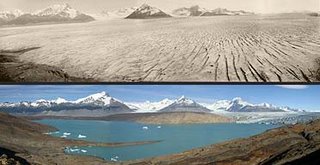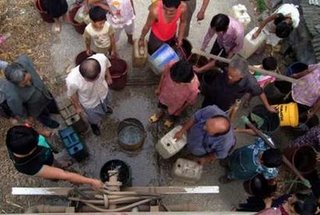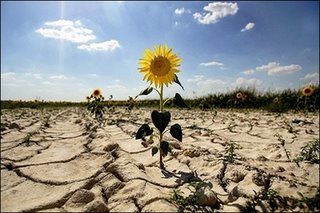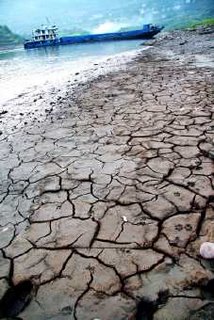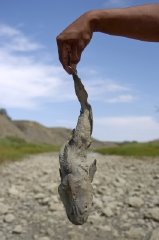This entry is in response to an article in the Edmonton Sun in which Klein trashed Al Gore's remarks regarding the oil sands extraction process in Alberta. I think people need to see the truth behind the environmental degradation being caused by this that will not in the longrun sustain our planet, but only an addiction that is costing people their planet. Many will get rich off of this process, but it will not be the people. The cost in continuing to contribute to the climate crisis we face will be immense if the people (particularly in Canada) do not speak out regarding the methods employed by the same status quo to continue this addiction by looking for any way to get their fix.
Like all projects surrounding oil, the potential for the development of this industry has been touted only by those who stand to profit most from it: oil companies, governments, and the media which serves them. However, there are environmental repercussions to oil sands extraction that contradict the moral courage we need to face the climate crisis head on.
Oil sands extraction is not one of the methods that will lead to our planet being sustainable for the future, and oil sand extraction is as Al Gore pointed out, just a way for a junkie to look desperately to get his fix. It is sustainable and alternate energy sources that will ultimately save this planet, along with all of us breaking the addiction we have to oil.
In this entry I hope to give information about what oil sand extraction is, and the environmental implications it has on land and especially groundwater and water resources.

Boreal forest, Alberta, Canada-Isn't it magnificent?
Some background:
The boreal forest of Alberta, Canada has remained a wilderness since it's creation from the receding glacial tundras that bore it, but has recently seen rapid resource development, mainly in oil sand extraction which has led to the land being stripped, rivers such as the Athabasca being polluted and diverted, and a true biogem being systematically destroyed for profit in order to sustain an addiction that will only continue to harm the environment and contribute to the climate crisis we face in this world. Just as we should be reflecting upon our moral obligation to save our world from our behavior, the Albertan government seeks to only add to that immoral behavior by contradicting the Kyoto pledge of its government to decrease their greenhouse gas emissions at the expense of this magnificent and necessary link in the biosphere chain.
The boreal forest region covers 48% of Alberta, Canada and endangered species such as the whooping crane and woodland caribou make this wonderland their home and look to it for their survival. It is also a beautiful place of rolling landscapes, huge rivers, and heavily forrested bogs that account for 25% of the Earth's remaining forests, and covers 1.4 billion acres. Forty percent of North America's water fowl and 300 different bird species also depend on this magnificent land for their survival. And this is now what is being done to it:
Oil sand extraction:
"We appreciate the fact that Canada's tar sands are now becoming economical and we are glad to be able to get the access toward two million barrels a day."-George W. Bush, March 23, 2003.
Powers in this world are now salivating to be able to tear apart the boreal forest to satisfy their lust for greed. And make no mistake about it, it has nothing to do with caring about the people or other species because if it did alternate sources of energy that are safer for the environment and cleaner and more economical to use would be the order of the day, not the "new world order" of the Bushes of this world that seek only to destroy it for their own benefit. But then, getting his fix seems to be something Bush is accustomed to in his life.
Making crude oil from tar sands is a dirty wasteful business. It takes two tons of oil sands ore to yield ONE barrel of oil. Put that into perpsective of these people wanting two MILLION barrels a day, and then it is not hard to see the environmental degradation this process is causing. The oil sand is composed of silt, sand, clay, water, and bitumen. On average, bitumen contains 83.2% carbon. At two million or more barrels a day burning, you figure out the environmental impact of that. And there are two methods by which this noxious smelling concoction is brought to the surface.
It is either through strip mining it or situ recovery methods which are used to access deeper deposits. It is an arduous process that uses much water, which then results in groundwater being polluted and river water being diverted as large amounts of freshwater are required to flush bitumen from the sand to make crude oil. It also is increasing greenhouse gas emission in Alberta, which are spilling over. It is also such a complex process that I went searching for a source that could explain it all from beginning to end, and I found one. This to me is the most thorough and comprehensive source out there now to describe this process and the environmental and climate change effects it is having on our world. I HIGHLY recommend you read through this:
Oil Sands Fever
Then when you have the truth about the wastefulness of this procedure in regards to our future sustainability, read these:
Troubled Water, Troubling Trends
SUNCOR Fails to Show Environmental Leadership
Oil Sands Production Costs Skyrocket
Oilsands Sector Shudders
And, from Wikipedia:
Tar sands development has a direct impact on local and planetary ecosystems. In Alberta, the strip mining form of oil extraction completely destroys the boreal forest, the bogs, the rivers as well as the natural landscape. The mining industry believes that the boreal forest will eventually colonize the reclaimed lands, yet 30 years after the opening of the first open pit mine near Fort McMurray, Alberta, no land is considered by the Alberta Government as having been "restored."
Furthermore, for every barrel of synthetic oil produced in Alberta, more than 80 kg of greenhouse gases are released into the atmosphere and between 2 and 4 barrels of waste water are dumped into tailing ponds that have flooded about 50 km² of forest and bogs. The forecast growth in synthetic oil production in Alberta also threatens Canada's international commitments. In ratifying the Kyoto Protocol, Canada agreed to reduce, by 2012, its greenhouse gas emissions by 6% with respect to the reference year (1990). In 2002, Canada's total greenhouse gas emissions had increased by 24% since 1990.
And all I can say to this is WHY? WHY do people who KNOW what these processes do to our planet CONTINUE TO DO IT, when proven alternate methods that sustain ALL living creatures are available? Why do governments that claim to be there for the good of the people do NOTHING but work against their good? I look at what will be done to the boreal forest of Alberta and surrounding areas should this continue, and I weep.
Al Gore was once again correct. THIS process is not only detrimental to Alberta and surrounding regions, it is detrimental to our planet. It is time for the Canadian people to stand up to their government that is trying to Bushify their country, and say NO to oil sands development. The American people must also speak out for the boreal forest, and against anymore attempts to suck the life out of this planet for greed. Unless we do, we are only accomplices in our own suicide. And no, I do not believe that is too strong a description of our fate unless we wake up.
I cannot think of a better to conclude this;
Qwatsinas [Hereditary Chief Edward Moody], Nuxalk Nation:
"We must protect the forests for our children, grandchildren and children yet to be born. We must protect the forests for those who can't speak for themselves such as the birds, animals, fish and trees."
Ancient Indian Proverb:
"Treat the earth well: it was not given to you by your parents, it was loaned to you by your children. We do not inherit the Earth from our Ancestors, we borrow it from our Children."
And one last comment to Ralph Klein: You say Al Gore is full of hot air? Well, look around Alberta Canada, for it is now full of hot air that you condone being pumped into the atmosphere daily even though scientists have already consented that it is our behavior that is contributing to global warming by pumping it there. Al Gore is full of facts, while you seem to be filled with nothing but denial.
